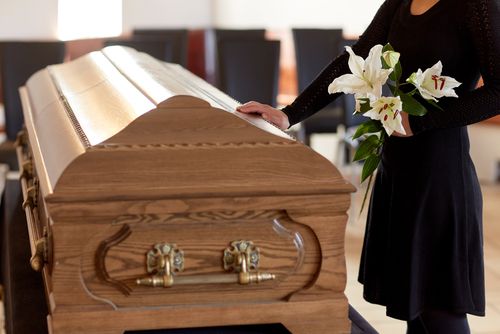 After a loved one passes, there is a lot of work to be done when it comes to making funeral arrangements. When you’re busy selecting a location for the wake to determining the specifics of the burial, you might not spend a lot of time thinking about the funeral itself. The family of the deceased is usually front and center during the event, which can make it somewhat difficult to process all of the emotions you’re going through. If you’re concerned about how you should be acting, now is the time to familiarize yourself with basic etiquette.
After a loved one passes, there is a lot of work to be done when it comes to making funeral arrangements. When you’re busy selecting a location for the wake to determining the specifics of the burial, you might not spend a lot of time thinking about the funeral itself. The family of the deceased is usually front and center during the event, which can make it somewhat difficult to process all of the emotions you’re going through. If you’re concerned about how you should be acting, now is the time to familiarize yourself with basic etiquette.
Greeting Friends and Family
The emotional toll that comes with the death of someone close to you can make the entire concept of etiquette seem vastly unimportant. Still, you know that people will be approaching you throughout the funeral to offer condolences. Tradition states that the bereaved are typically expected to greet everyone. If there is a wake, you can make this easy on yourself by standing near the casket so people can pass by you after paying respects to the departed.
No matter what might be expected of you, it is most important to take care of your own needs. If you feel overwhelmed at any point, walk away. Go outside and get a breath of air or drink a glass of water to ground yourself. If you need to sit for the rest of the night, that is also completely fine.
How To Dress
The way you dress for the services will depend largely on your culture. In places like the United States, it is traditional for the relatives of the deceased to wear black. Though commonplace, it is far from the only way you can dress for the funeral. The departed might have been the type of person who hated the solemn and stifling nature of some customs. Should it feel more appropriate to wear a bright and colorful outfit, then follow this impulse. Staying true to the person you are honoring is important above all else.
Get Accustomed to Repetition
You’re going to be hearing a lot of the same phrases and sentiments from the people who attend the funeral. Though it can feel empty after hearing “I am so sorry for your loss” for the fortieth time in a row, try and remember that all of these words are being delivered from a place of love. The repetition might wear on you, but try if possible to hold onto the emotional core of each message being delivered.
Difficult or Uncomfortable Conversations Happen
Be prepared to field some difficult or awkward questions throughout the events. Death can be uncomfortable for people and make them act in peculiar ways. Friends might not know how to approach you and may use inappropriate jokes or comments as a way of testing the waters. Try not to be too hard on anyone, as you can likely understand how complicated these situations can be for everyone involved. Should anything get too tense for your tastes, simply offer thanks to the individual for coming and find a way to transition to another conversation.
After the Services
The weeks after the funeral will be a blur. You’ll likely receive many visitors, such as those wishing to see how you are and offer food or other assistance. As this slows down, one task that you should try and tackle is writing thank-you notes. Though it shouldn’t be your top priority when grieving, the act of thanking friends and family for kindness during a tough period can help you work through your own pain.
Knowing what is expected of you at a funeral can take a lot of weight off your shoulders. As long as you do what’s best for your own healing process, those in attendance will be understanding.